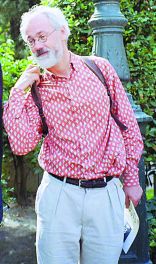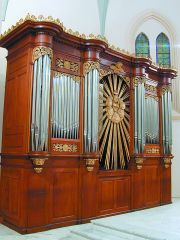 Brian Hick in conversation with Jan Willem Jansen (right) and Jean Baptiste Dupont.
Brian Hick in conversation with Jan Willem Jansen (right) and Jean Baptiste Dupont.
'The Festival must be a celebration, a party which we hope will lead people to a more serious enjoyment or understanding of the organ. But if they don't enjoy it at first they will not come back for more.' said Jan Willem Jansen.
This is Thursday and while we chat in the foyer of the Holiday Inn Jan's mobile is constantly buzzing with minor adjustments to the programme.
From the start it has been important to link the academic to the popular. The Festival has issued recordings and publications each year which have arisen from the performances, lectures and master classes. There have always been performances in the wider area to take in as many as possible of the fine instruments in the nearby countryside. However, with over 370 designated important organs within a short drive it would be impossible to do more than discover a small handful in a first visit. Needless to say the visits to country organs are closely linked to visits to equally fine restaurants.
Though the city is very supportive and always has been there have been some minor adjustments needed this year as the level of support has not been as great as in the past and some of the more ambitious projects have had to be cut back. Toulouse provides about 70% of the funding for the Festival with extra money from the Government - and all this in addition to the state's commitment to maintaining the many organs designated as historical monuments. There is virtually no involvement of private sponsors as we have in Britain and the organisers do not have to spend most of their time trying to raise money for the events. There is an assumption that organ music is culturally important and so it is supported.
One of the major problems still affecting the Festival is the explosion which took place two years ago. When the force of the explosion travelled down the river it took out most of the windows in the surrounding buildings, showering glass into many of the larger instruments. Though the money is available to repair these the time factor has meant that many organs are still not fully in use and some will need major renovation. With windows blown out at the top of buildings not only the weather but the wild life got in and there is extensive damage from pigeons - to say nothing of the smell!
Not only is there an almost unbelievable range of instruments, but the Festival is planning to add to the present number and hopes soon to have a Spanish organ which will complement the German and Italian instruments already in place. With Toulouse so close to the Spanish border there is a definable influence in the city itself and a heritage of Spanish music.
One of the problems of restoring the instruments they have is the fact that any restoration alters the instrument. Inevitably a builder makes his own mark on the organ, for good or ill, and that has to be taken into consideration whenever any restoration is commissioned.
Though the position of the instruments seems far stronger than would be the case in Britain, the problems of organists and audiences are uncomfortably similar. Most organists are unpaid, and while there are many enthusiastic young performers in training there are simply not enough jobs for all those who would like to be professional organists - and the demand for solo performers is even more limited. At the same time mass attendance is low and getting lower, so that many young people have no involvement with the organ at all. They simply never hear it and dismiss it as part of the church establishment.
Jan Willem Jansen suggested that what we really need are far more good amateur organists rather than dedicated professionals. Organists who are drawn from the ranks of doctors, scientists, engineers - people who will place their enthusiasm within a far more global context rather than the narrow confines of the music school. You don't need to live for the organ to love the music and play it well. There is often a problem with patient plodding students who are extremely dedicated yet unexciting in performance. 'I try to dissuade them!'

We discussed electronic instruments. There are very few in France and there is no real market as the existing organs are well maintained - with often the instrument in better condition that the building in which it stands. However there are also very few new pipe organs in France. Most are restorations and most builders are dedicated to restoration not the creation of new instruments.
'What we really need is a new vision among organ builders. New colours, new registers but this can only come with large instruments!
Toulouse has always had a good reputation for encouraging new music mainly because there is a thirst for it. However the Festival has not yet been able to commission large scale new works though it hopes to do so in the future.
'One of the problems is that so few modern composers write for the organ. They really don't know what the instrument can do. We would love to develop links between jazz and the organ - to find a new audience that way. It would also be good to get composers to write new music for our historic organs - music that would fit the North German or Italian style of organ.'
For more on Toulouse les Orgues, read Raymond Spong's article here. The organ pictured on the right is the Callinet of Saint-Marc, mentioned in Brian Hick's article on the festival in issue 326 of The Organ.
